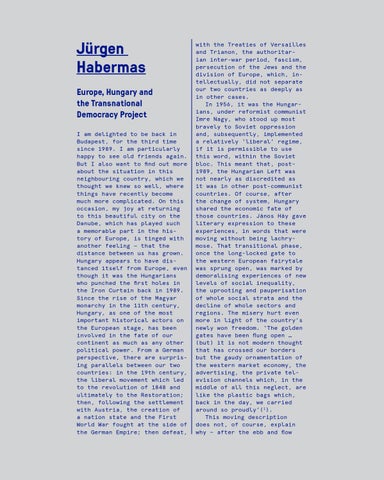Jürgen Habermas Europe, Hungary and the Transnational Democracy Project I am delighted to be back in Budapest, for the third time since 1989. I am particularly happy to see old friends again. But I also want to find out more about the situation in this neighbouring country, which we thought we knew so well, where things have recently become much more complicated. On this occasion, my joy at returning to this beautiful city on the Danube, which has played such a memorable part in the history of Europe, is tinged with another feeling — that the distance between us has grown. Hungary appears to have distanced itself from Europe, even though it was the Hungarians who punched the first holes in the Iron Curtain back in 1989. Since the rise of the Magyar monarchy in the 11th century, Hungary, as one of the most important historical actors on the European stage, has been involved in the fate of our continent as much as any other political power. From a German perspective, there are surprising parallels between our two countries: in the 19th century, the liberal movement which led to the revolution of 1848 and ultimately to the Restoration; then, following the settlement with Austria, the creation of a nation state and the First World War fought at the side of the German Empire; then defeat,
with the Treaties of Versailles and Trianon, the authoritarian inter-war period, fascism, persecution of the Jews and the division of Europe, which, intellectually, did not separate our two countries as deeply as in other cases. In 1956, it was the Hungarians, under reformist communist Imre Nagy, who stood up most bravely to Soviet oppression and, subsequently, implemented a relatively ‘liberal’ regime, if it is permissible to use this word, within the Soviet bloc. This meant that, post1989, the Hungarian Left was not nearly as discredited as it was in other post-communist countries. Of course, after the change of system, Hungary shared the economic fate of those countries. János Háy gave literary expression to these experiences, in words that were moving without being lachrymose. That transitional phase, once the long-locked gate to the western European fairytale was sprung open, was marked by demoralising experiences of new levels of social inequality, the uprooting and pauperisation of whole social strata and the decline of whole sectors and regions. The misery hurt even more in light of the country’s newly won freedom. ‘The golden gates have been flung open … (but) it is not modern thought that has crossed our borders but the gaudy ornamentation of the western market economy, the advertising, the private television channels which, in the middle of all this neglect, are like the plastic bags which, back in the day, we carried around so proudly’(1). This moving description does not, of course, explain why — after the ebb and flow
